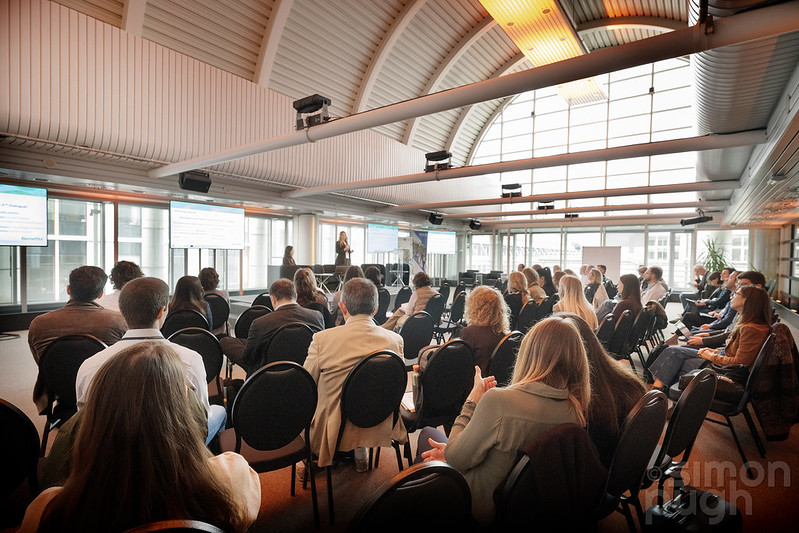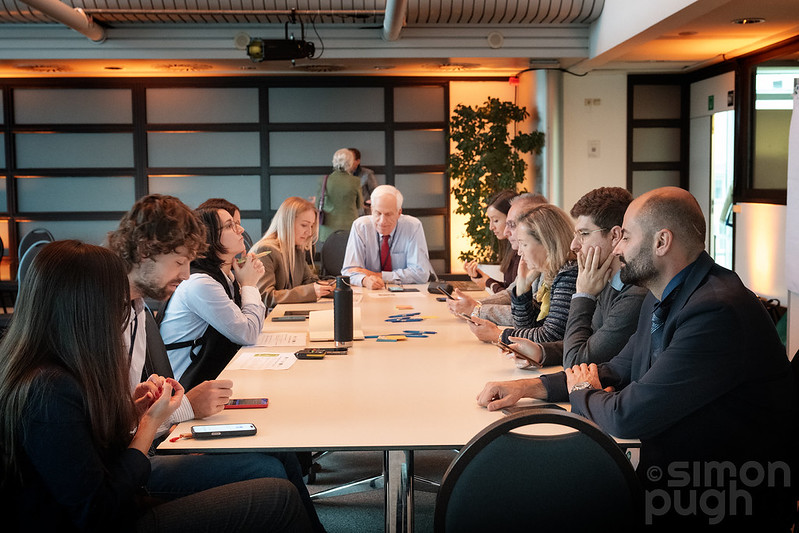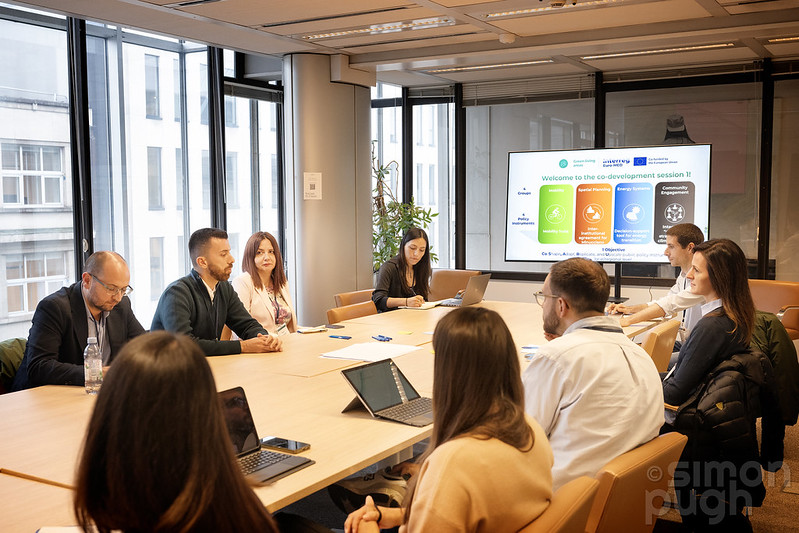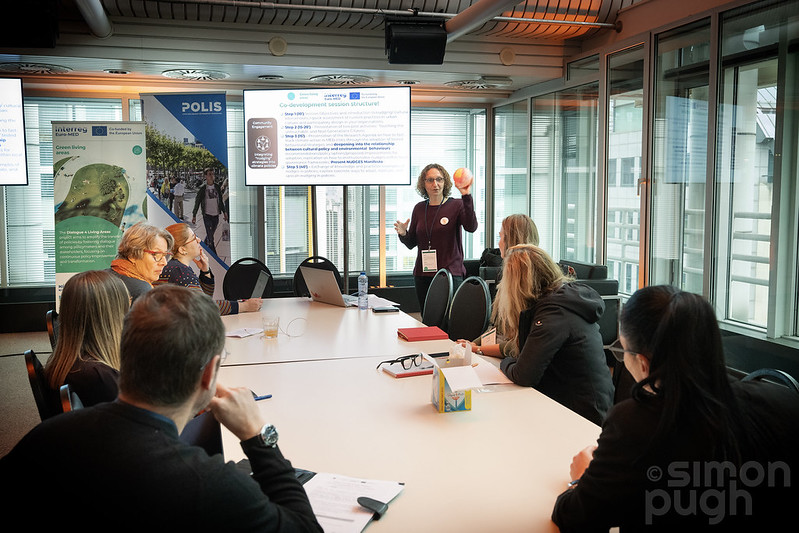 The 2nd Institutional Policy Dialogue of the Green Living Areas Mission took place in Brussels on 15–16 October 2025, gathering local authorities, researchers, and policy-makers from across the Mediterranean to exchange solutions for greener, more sustainable regions.
The 2nd Institutional Policy Dialogue of the Green Living Areas Mission took place in Brussels on 15–16 October 2025, gathering local authorities, researchers, and policy-makers from across the Mediterranean to exchange solutions for greener, more sustainable regions.
Building on the 1st Dialogue, the event consolidated a community of practice around policy transfer, with seven “policy champions” showcasing innovative instruments for sustainable mobility, energy transition, climate action, and urban regeneration.
Day 1 – showcasing and co-developing Mediterranean policy solutions
The first day opened with a review of progress since the inaugural Dialogue, presented through the Euclid Policy Hub, which supports knowledge sharing, policy transfer, and stakeholder cooperation across the Euro-Mediterranean area. Participants reaffirmed the Hub’s role in facilitating dialogue, identifying “policy windows,” and developing recommendations based on tested models.
A presentation on the Ecosystemic Transition Unit (ETU) model followed, outlining how project results can be embedded into governance frameworks—such as local and regional action plans or SUMPs—and announcing upcoming activities, including the ETU online platform launch in late 2025.
Policy champions from Thematic Projects
Four thematic projects took centre stage:
- GREENMO: A practical strategy to design and implement inclusive mobility hubs, linking sustainable transport with urban services. Antwerp’s Smart Links initiative complemented this discussion, offering insights on governance, funding, and design adaptation.
- LOGREENER: An integrated decision-support tool helping municipalities plan energy transitions and fiscal policies for renewables. Discussion focused on technical complexity, data availability, and potential inclusion in the Covenant of Mayors repository.
- NUDGES: Explored how behavioural “nudging” and cultural interventions can accelerate climate action, highlighting sensory engagement and community participation to foster sustainable habits.
- BAUHAUS4MED – Minucciano: Demonstrated inter-institutional cooperation between the Region of Tuscany, Municipality of Minucciano, and University of Florence for sustainable regeneration of inner areas through participatory design and the New European Bauhaus principles.
Co-development sessions
Participants then joined in-depth sessions to exchange lessons and identify replication opportunities:

- GREENMO & Smart Links Antwerp: Recommendations emphasised adaptable design, public-private partnerships, and citizen engagement for Mediterranean conditions.
- LOGREENER: Stakeholders discussed technical challenges and proposed simplified training, localisation, and policy synergies with EU frameworks.
- NUDGES: Highlighted that perception drives behaviour—linking cultural identity and sensory experience with environmental responsibility.
- BAUHAUS4MED: Debated participatory financing (crowdfunding and private partnerships) and institutional continuity for small-scale regeneration projects.
Day 1 concluded with a shared message: cooperation, inclusivity, and adaptability are essential to ensure that tested solutions become embedded, scalable policies across the Mediterranean.
Day 2 – From demonstration to policy transfer
The second day opened with a demonstration of the EUCLID Policy Hub Platform, a collaborative online platform designed to map, connect, and scale successful policy instruments. The Hub’s catalogue, interactive policy map, and community forum will support continuous dialogue and policy transfer between stakeholders.
Policy champions from mature policy instruments
Three advanced policy models were presented:
- Karlovac Green City Action Plan (Croatia): A €245 million roadmap integrating evidence-based planning and citizen participation, using the Pressure-State-Response model to prioritise sustainable investments.
- Thessaloniki 2030 Climate Neutrality Action Plan (Greece): Showcased multi-level governance, the Climate City Contract, and investment planning toward EU-mission climate neutrality by 2030.
- OECOOP Model (Catalonia, Spain): A cooperative structure supporting over 65 renewable energy communities, proving the power of local alliances between municipalities and citizens for the energy transition.
Co-development sessions

- Karlovac GCAP: Focused on capacity building, financing (including EPC/ESCO models), and participatory governance to replicate the GCAP methodology in other Mediterranean cities.
- Thessaloniki 2030: Discussions centred on institutional capacity, simplification of administrative frameworks, and peer-learning mechanisms for replication across regions.
- OECOOP Model: Participants examined legal and organisational barriers to energy communities, stressing the need for early legal engagement, shared governance, and social inclusivity in replication efforts.
Policy Training
The afternoon session, led by POLIS, addressed “Mind your message: how to effectively communicate sustainability policy.” Using case studies such as Barcelona’s superblocks and Amsterdam’s 30 km/h zones, participants explored communication strategies to frame messages positively and build citizen trust in green transitions.
Next Steps
The Dialogue closed with commitments to:
- Strengthen cooperation to enable more Mediterranean municipalities to adapt and upscale successful policy instruments.
- Consolidate collaboration with EU institutions and key partners such as MEDENER.
- Develop integrated processes addressing challenges in green mobility, energy, climate, and spatial planning.
- Continue supporting thematic projects through the Green Living Areas Mission and its policy community.
Upcoming milestones include the ETU online platform launch (November 2025), national events in early 2026, and the 3rd edition of the Green Living Areas Thematic Community event in Patras (April 2026). The Green Living Areas Mission will also develop policy-related outputs, resulting from the 2nd Dialogue, to be published in early 2026.
Through continued dialogue and policy transfer, the Green Living Areas Mission is shaping a more sustainable, resilient, and inclusive Mediterranean future.


